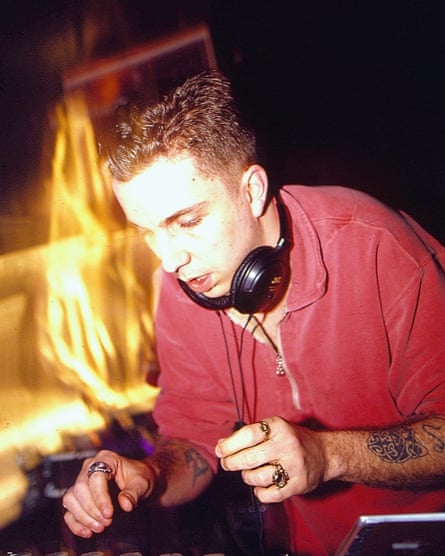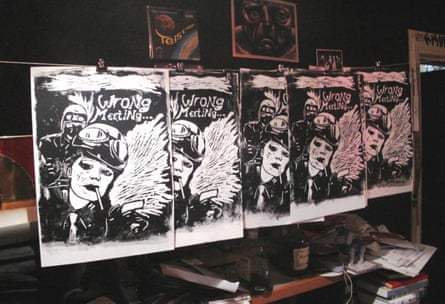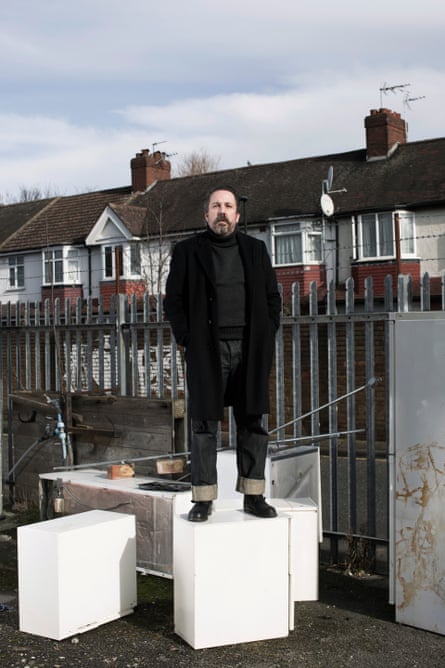I’ve been in Andrew Weatherall’s company for about five minutes, and he has, a little unexpectedly, got on to the subject of the Albigensian crusade of the 13th century, in which the papacy ordered the extermination of the Cathar sect in southern France. I had arrived, been given a quick tour of the quite spectacularly grim Tottenham industrial estate where Weatherall’s studio is located – “I thought, this is perfect, it’s absolutely horrible,” he says, ruefully, “but the first week I’m here, I hear this commotion out in the road and it’s a young person’s pop group making a video, so there goes the fucking neighbourhood” – and then he started telling me about the Cathars: the siege of Carcassonne, the massacre at Béziers, how the 5th Airborne division in Vietnam adopted their motto from the instruction given to the crusaders by Arnaud Amalric, the abbot of Béziers: “Kill them all, God will know his own.”
Weatherall got interested in the Cathars when he started organising a small festival in Caracassonne: it shares its title with that of his new album, Covenanza, which was the name of the ceremony the Cathars underwent when they committed to the faith. “You know, acid house and suchlike are very ritualistic and all about transcendence,” he says, laughing. “I like to think I’m aiding people’s transcendence. Obviously, the combination of pumping house music and drugs isn’t like studying lengthy tomes, but at some point, you realise that the long way round is equally as enjoyable as the short cut.”
This turns out to be an archetypal Andrew Weatherall story: it’s circuitous, fascinating, full of arcane information and a bit self-deprecating. He says he thinks of his work as “a series of beautiful, totally futile gestures”, which is certainly one way of describing his 28-year musical career. If you were looking for an alternative take on events, you might note that, in some circles, his uncompromising idiosyncrasy has earned him the respectful nickname the Guv’nor. He first emerged as resident DJ at pioneering acid-house club Shoom and co-author of the era’s legendary fanzine Boy’s Own, went on to produce large parts of Primal Scream’s epochal album Screamadelica, make a vast number of acclaimed records in a vast number of genres under a bewildering mass of aliases, launch a series of record labels – he’s currently running three – DJ in a panoply of styles, exhibit his lino-print artworks at the ICA and enjoy a recent tenure as Faber & Faber’s artist in residence (“I found myself sitting on the top floor of Faber & Faber, with a bust of TS Eliot up here, and a bust of Ezra Pound over there, thinking, ‘All right, so what, you’ve read a few books, you’re really going to get found out now’”).

Whatever his career has been, it has left Andrew Weatherall quite the raconteur. He has a way with words – he describes a DJ set by Scottish duo Slam as “absolutely full-knacker proper panel-beaters-from-Prague-’ere-we-go techno” – an endless store of anecdotes, and an intriguing set of cultural reference points: “I’m an autodidact, because I got chucked out of school.” Over the course of an hour and a half we go from Joseph Conrad’s novel The Secret Agent to the “magnificence” of Wizzard’s 1974 album Introducing Eddy and the Falcons, via Francis Bacon and William Burroughs’ line about how if you’re in a hurry to show somebody your art, you should throw it in the trash because it’s bound to be rubbish. “Be patient. Very pertinent to today,” he says. “Digital culture sells you this theory that if you don’t get involved immediately, you’re going to be left behind. When you see an advert for broadband, it’s always got a caveman in it, because if you haven’t got the latest broadband, you’re a caveman. But if you’re making music or any art, just wait, wait six months, see if you still like it. If you release something immediately, you’re not going to be happy with it and it’s just going to be part of the digital noise.” He chuckles. “Here we are at the apex of the punk-rock dream, the democratisation of art, anyone can do it, and what a double-edged sword that’s turned out to be, has it not?”
As he talks, he rolls and smokes a succession of spliffs and strokes his luxuriant moustache. The rest of his equally luxuriant facial hair – the Edwardian-inspired look that seemed to launch a thousand hipster beards – has gone. “Getting rid of it wasn’t a protest thing, it was more to do with total boredom and being in a state that Julian Cope would describe as ‘heroically stoned’. It was getting not Reubenesque so much as Rick Rubinesque. I was in the studio, very stoned, decided to go to Tesco’s for some food. I was sort of stumbling about Tesco’s, did a comedy pratfall that Norman Wisdom would have appreciated, and as I went to steady myself, I found my hand touching a shelf full of safety razors. Now, I’m not a cosmic cat, but I know when I’ve had a little message from Jah. So I grabbed a packet of eight razors, which nearly wasn’t enough, and set about it. It was like shearing a sheep.” After he appeared in public without the beard, a listing appeared on eBay purporting to offer clippings from it for sale. “Internet pranksters,” he says, mordantly. “My favourite kind of people.”
Weatherall has a tendency to depict his entire career as a series of happy accidents. He started out as a fan of industrial music and a vocalist in a post-punk band – “I had the Hitler Youth haircut, the German army vest, the big shorts, thought I looked like I was in A Certain Ratio, actually looked like Don Estelle in It Ain’t Half Hot Mum” – recruited to DJ at Shoom when the club’s founder, Danny Rampling, heard him play a record by ex-Throbbing Gristle members Chris & Cosey at a house party: “From what I can remember, the first time they put me on was at a rave on a farm somewhere. And, God bless them, they thought they would kind of re-enact the kind of foam parties they had at Amnesia in Ibiza. But what they’d forgotten to remember was that this was a cow shed, and there was a certain amount of detritus on the floor. So I’m playing the Style Council’s Shout to the Top and the foam starts whipping up, and it’s just flecked with cow shite and bits of straw. But I loved that. It was a wonky approximation of Ibiza, they’d done it a bit fucking wrong and that somehow made it more beautiful. Like Paul Oakenfold coming back and going, ‘We’re going to recreate the beautiful Balearic vibe,’ but he tries to do it in a nightclub in Streatham called Ziggy’s that had [famed London hardman] Nosher Powell on the door. You know what I mean? That’s beautiful.”
He is, by some distance, the least misty-eyed of the Second Summer of Love’s DJ pioneers. Some of the music was terrible, he says. The famous incident in which he covered over the label of a newly purchased and apparently covetable 12” with a sticker saying “FUCK OFF NOSY” was to hide the fact that it was “a single by Leslie Grantham that I’d found in a bargain bin. It had an instrumental dance mix on the B-side, and I was so desperate to have a record no other DJ had that I actually played it. I mean,” he adds, “I don’t know if anyone else plumbed such ridiculous depths.”
He isn’t much interested in nostalgia for the era. “It was like having a holiday. I’d been in the dark post-punk world of shadows and neon in the rain. And suddenly I’ve been given this drug that makes me love everybody and, ‘Oh, this music’s quite uplifting.’ But I didn’t become a casualty of it. At some point I stood back and went, ‘Hold on, the only thing I’ve got in common with these people is that we’re in the same room and on the same drugs – I’ve tried talking to them outside, we’ve got nothing in common.’ So I’m not too big on the reunions. It’s like, those fucking people were horrible 25 years ago and now they’re not taking ecstasy, they’re taking cocaine. So they’re going to be even fucking worse.”

Still, he parlayed his acid-house fame into a career as a DJ and remixer. You might have thought his work on Screamadelica would have led to a career as a producer of major bands, but it didn’t really pan out like that, not least because Weatherall finds musicians “quite a painful bunch to be around”. “Oh, you know, fragile egos, introverted extroverts, all that. Musicians in the studio can be slightly tiresome, even when they’re very nice people, because they want their record to sound how they want,” he frowns, as if presenting me with prima facie evidence of spectacularly unreasonable behaviour. “But that’s not how Screamadelica was done. The Scream recorded stuff, and then they just trusted me, because what did we have to lose? Obviously, Loaded had been a hit, but neither of us had much of a career to worry about. So when I get asked to do stuff, I tell them that’s how I do it. A lot of bands think it’s a great idea. Record companies – not so keen. They don’t want to entrust one person.”
Similarly, as other DJs went on to lucrative pop careers, Weatherall slipped off down a more abstruse and leftfield path. “When that superstar DJ thing began to take off, I thought, ‘DJs? Heroes? Are people really that desperate? I know people want heroes, but seriously, this is ridiculous.’ It was very tempting, because the money to be made and the larks to be had were manifold. It wasn’t a grand, anti-commercial gesture, because I love pop music and I don’t decry people. But call me unambitious, I was fine as I was. I’m quite happy at this level. When it becomes a career, a career in any business looks quite tiresome and vexing and like it might involve me having meetings with people I don’t want to have meetings with.”

Instead, he carved out a curious, serpentine path thorough the shadowier fringes of house music and techno, with a variety of collaborators, under a variety of names: Two Lone Swordsmen, the Asphodells, the Woodleigh Research Facility, Klart, Aramchek, the Chairman. Occasionally, it looked as if he might be deliberately short-circuiting projects when they seemed in danger of becoming too big, not least his mid-90s dub-influenced trio Sabres of Paradise. Sometimes Weatherall has seemed remarkably ahead of the curve: before the early-00s post-punk revival, he released a mix CD, 9 O’Clock Drop, featuring the kind of early-80s artists that were soon to become extremely hip names to drop (23 Skidoo, Chris & Cosey). On other occasions, his activities have seemed a bit inexplicable. A few years back, he formed a “drum machine-based voodoo rockabilly” band, with himself as lead singer: “It was mentally, physically and financially challenging. The gigs were either magnificent, or absolutely diabolical.” He goes on to tell a lengthy story about a disastrous appearance at Bestival – “in front of a load of boho-chic people with papooses on, who’d apparently just enjoyed a band called Grand National doing a cover of Walking on the Moon by the Police” – that concluded with Weatherall “lying on my back in the middle of the stage shouting: ‘WE’RE ON OUR WAY TO SATANVILLE!’ with what was left of the audience disappearing”. Did the experience of being in a band change his attitude to musicians? “No, no, it just affirmed what I knew,” he laughs. “That they’re an absolute shower of fucking pricks. And the people in that band were my mates.”
He’s singing again on Covenanza, a dubby, dark album that once more bears the influence of post-punk as well as Weatherall’s esoteric reading habits, this time involving early-20th-century central European literature: “I’m quite proud of the fact that I’ve made the first disco record to mention Hans Fallada and Robert Walser.” At 52, he still retains an impressive passion for DJing: “I’ve never lost that. It’s quite vampyric, DJing. You’re never going to have that feeling of hearing that record for the first time again, but if you look into the eyes of someone who’s hearing it for the first time, it’s a nice vicarious feeling. But it’s not selfish. I think I’ve never lost that thing I had when I was 12 years old and inviting my mates round to my house. They’d all be copping off with girls and I’m going, ‘No, check out this B-side.’ I’ve never lost that slightly nerdy approach to wanting to share what I like.” And then he starts talking about something else, which, true to form, somehow leads into a digression about the utopian thinker John Hargrave and his mystical 1920s alternative to the Boy Scouts, the Kibbo Kift.

Comments (…)
Sign in or create your Guardian account to join the discussion